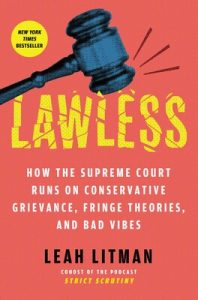Leah Litman, How the Supreme Court Runs on Conservative Grievance, Fringe Theories, and Bad Vibes
Atria, 2025
In October, the U.S. Supreme Court, in Chiles v. Salazar, took up a religious challenge to Colorado’s ban on conversion therapy — a harmful, pseudoscientific practice, as defined by medical experts, aimed at changing a person’s sexual orientation, gender identity or gender expression to conform with heterosexual and cisgender norms.
Medical expertise, however, is of little interest to the Court in the Chiles case. Nor are long-established standards for accepting a case.
As Slate senior writer Mark Joseph Stern observed prior to the hearing, Chiles v. Salazar is “a manufactured case,” the plaintiff having no actual standing, defined as “establishing a sufficient connection to and harm from the law or action being challenged.” Instead, it is a case manufactured by a white Christian Nationalist law firm to give pretext for the court to restrict the freedoms of LGBTQ+ people and women.
This is no surprise to Leah Litman, who, as a co-host of the Supreme Court-focused “Strict Scrutiny” podcast, has long rolled her eyes at the “gaslighting” of America by the court’s majority justices.
In her new New York Times-bestselling book — Lawless: How the Supreme Court Runs on Conservative Grievance, Fringe Theories, and Bad Vibes — Litman sarcastically excoriates extremist justices who judicially favor, in the words of Justice Amy Coney Barrett, a “biblical view about marriage.” After all, allowing unbiblical marriages would be “discrimination against religious and social conservatives who don’t believe in equality for LGBT individuals,” Litman bitingly says of the court’s majority agenda of the last decade.
Invoking popular culture, Litman observes that the court majority’s “legal reasoning is mostly just vibes.” The leading justices are like “mean girls” who “gesture toward” equality “but aren’t that serious,” instead blithely misquoting prior legal precedent to justify their dismantling of inclusive American democracy and implementing of one narrow version of Christian rule. Or “a banana republic where government is of, by, and for the mega-rich.” Or both.
“The Court has become so insulated from the public and so powerful in the political system, it is using law to attack government itself,” Litman scolds. “The Court has been upending constitutional law, the body of law that structures the government, and it is now moving on to eating away at government as such.” Even to the point of ruling “that states can guard against non-existent voter fraud by effectively prohibiting people from voting.”
What lies behind such an obviously unconstitutional judicial philosophy? “The justices’ legal reasoning isn’t serious; neither is their behavior,” Litman observes, noting the “Court’s corruption” in service to, and benefiting from, billionaires — of which “the consequences for the country are [serious].”
In her caustic takedown of the nation’s highest court, conservative justices’ shifty legal arguments and rulings often have roots in opposition to actual religious freedom. Casually dismissing the First Amendment’s prohibition of the “establishment of religion,” they perversely twist the inclusive “free exercise” clause — protecting equal religious freedom for all — to apply only to “religious conservatives” who falsely perceive themselves victims of “rampant discrimination.”
With the prodding of Christian Nationalist, anti-religious freedom law firms, like-minded justices have long looked “for discrimination against religious and social conservatives” that does not actually exist, Litman argues.
How can America’s plainly “broken” Supreme Court be fixed? Litman encourages concerned Americans to channel their anger at the court’s lawlessness into advocacy and organizing: “Persuading people to care about the courts is how change happens. Friends don’t let friends remain in the dark about the Supreme Court.” In addition, “Vote in every single election at every single level.”
Strategically, Litman argues that “many of the methods” Christian Nationalists “used to create the current Court can be used to change it.” Anti-freedom extremists harnessed anti-democratic grievances to capture the nation’s high court; freedom-committed, democracy-focused Americans can begin turning the tide by capitalizing on majoritarian opposition to the court’s dehumanizing jurisprudence.
“Walking away from politics ensures the Court will remain as it is for the foreseeable future,” Litman warns. “It leaves unanswered the politics” that created the lawless court.
“So let’s get started” taking back our nation’s Supreme Court, she concludes.
